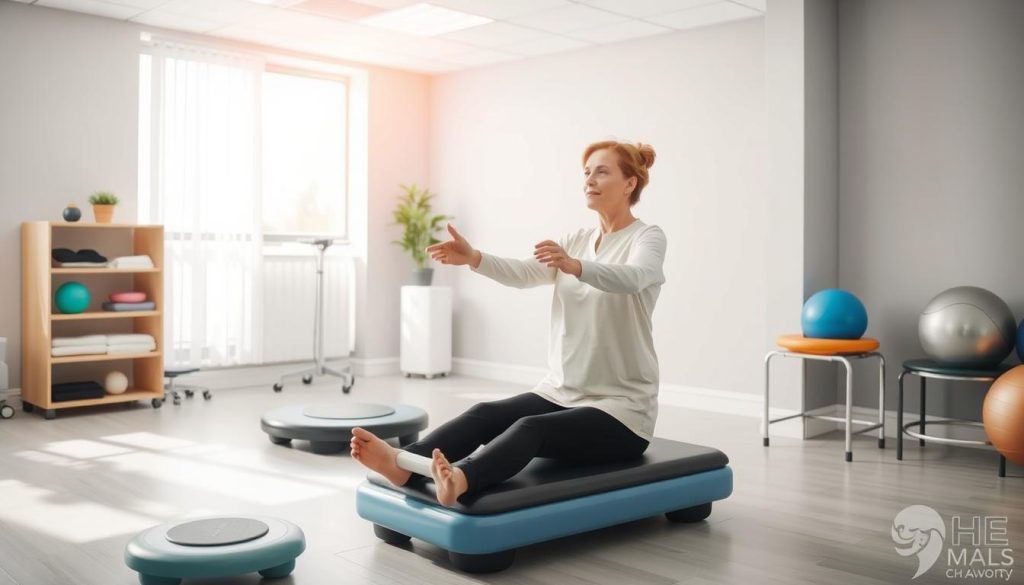Vertigo can make your world feel like it’s spinning out of control. But, there are effective ways to manage it. This guide will show you how to stop vertigo and find relief from dizziness. We’ll cover exercises and medical treatments to help you balance your life again.
If you’re facing vertigo, knowing your options is crucial. We’ll look at different ways to treat vertigo, from home remedies to medical procedures. By the end, you’ll have a range of methods to fight dizziness and manage your symptoms.
Understanding Vertigo: Causes and Symptoms
Vertigo is a complex condition that affects balance and spatial orientation. It’s important to recognize vertigo symptoms for effective management. This dizzying sensation can come from various causes, like inner ear problems or neurological issues.
Common Triggers of Vertigo Episodes
Vertigo episodes often have specific triggers. These can include:
- Sudden head movements
- Changes in position
- Stress and anxiety
- Certain medications
- Dehydration
Understanding these triggers is key when learning how do you stop vertigo attacks. By identifying personal triggers, individuals can take steps to minimize episodes.
Identifying Different Types of Vertigo
Vertigo comes in various forms, each with unique characteristics:
| Type | Cause | Duration |
|---|---|---|
| BPPV | Inner ear crystals | Seconds to minutes |
| Meniere’s Disease | Fluid buildup | 20 minutes to hours |
| Vestibular Neuritis | Inner ear inflammation | Days to weeks |
Distinguishing Vertigo from Other Balance Issues
While vertigo is a common balance issue, it’s distinct from other conditions. Unlike general dizziness, vertigo creates a spinning sensation. Lightheadedness or unsteadiness might indicate different balance issues. Accurate diagnosis is essential for proper treatment and management of vertigo symptoms.
How Do You Stop Vertigo: Immediate Relief Techniques
Vertigo can be really upsetting, but there are quick fixes. These tips can offer fast relief when vertigo hits.
The Epley Maneuver Step-by-Step Guide
The Epley Maneuver is a well-known way to treat vertigo from inner ear problems. Here’s how to do it:
- Sit on a bed, turn your head 45 degrees to the affected side
- Quickly lie back with your head on the bed, wait 30 seconds
- Turn your head 90 degrees to the opposite side, wait 30 seconds
- Roll onto your side in the same direction, wait 30 seconds
- Slowly sit up and remain still for a few minutes
Brandt-Daroff Exercises for Quick Relief
Brandt-Daroff exercises can ease vertigo symptoms. Follow these steps:
- Start in a sitting position on your bed
- Quickly lie down on your left side with your nose pointed up at a 45-degree angle
- Stay in this position for 30 seconds or until dizziness subsides
- Sit up for 30 seconds
- Repeat on the right side
- Do this cycle 5 times, twice daily
Emergency Stabilization Methods
When vertigo hits out of nowhere, try these quick fixes:
- Find a stable object to hold onto
- Sit or lie down immediately
- Focus on a stationary object
- Take slow, deep breaths
- Avoid sudden head movements
These quick relief methods can help manage vertigo. Always see a doctor if vertigo persists or gets worse.
Medical Treatment Options for Chronic Vertigo
Managing chronic vertigo often needs a mix of treatments. Doctors might give different medicines to help with symptoms and find the cause. Antihistamines can lessen dizziness and nausea. Diuretics help with Meniere’s disease. Sometimes, anti-anxiety or antidepressant drugs are used for vertigo treatment.

Vestibular rehabilitation therapy is a key non-medical treatment. It’s a type of physical therapy that helps the brain get balance right again. It includes exercises to improve gaze, posture, and balance.
For serious cases, doctors might suggest more serious steps. These can include:
- Injections of antibiotics or steroids into the inner ear
- Vestibular nerve section surgery
- Labyrinthectomy for Meniere’s disease
Managing chronic vertigo usually means using a mix of these treatments. Each plan is made for the patient’s specific needs. Regular check-ups with doctors help make sure the treatment is working well.
| Treatment Type | Examples | Suitable For |
|---|---|---|
| Medications | Antihistamines, Diuretics | Various types of vertigo |
| Physical Therapy | Vestibular Rehabilitation | Most chronic vertigo cases |
| Surgical Procedures | Labyrinthectomy, Nerve Section | Severe, unresponsive cases |
Essential Vestibular Rehabilitation Exercises
Vestibular rehabilitation is key in managing vertigo and improving balance. It includes exercises to help your brain and inner ear work better together.
Balance Training Programs
Balance training is a big part of inner ear balance exercises. These programs help you stay stable and lower the chance of falling. Start with simple exercises like standing on one foot, then move on to harder ones:
- Walking heel-to-toe in a straight line
- Standing on an uneven surface
- Practicing tai chi or yoga poses
Gaze Stabilization Techniques
Gaze stabilization helps reduce dizziness when moving your head. Try this exercise:
- Focus on a target at eye level
- Move your head side to side while keeping your focus
- Slowly increase speed as you get better
Head Movement Exercises
Head movement exercises are vital for vertigo. They help your brain get used to different positions. Start with slow, controlled movements and get faster as you improve. Here’s a simple exercise to try:
| Exercise | Instructions | Repetitions |
|---|---|---|
| Head Turns | Sit upright, turn head left to right | 10 times each direction |
| Head Tilts | Tilt head towards each shoulder | 10 times each side |
| Nodding | Slowly nod head up and down | 10 times |
Consistency is crucial in vestibular rehabilitation. Do these exercises often to see better balance and less vertigo.
Natural Remedies and Lifestyle Changes
Looking for natural ways to handle vertigo can really help. Simple changes in your life can ease the dizziness and feeling off balance that vertigo brings.
Dietary Modifications for Vertigo Management
Changing what you eat can help a lot with vertigo. Eating less salt helps keep the balance in your inner ear. Drinking less caffeine and alcohol can also cut down on vertigo attacks. Adding foods high in potassium, like bananas and spinach, helps your inner ear work better.
Stress Reduction Techniques
Stress can make vertigo worse. Adding stress-reducing activities to your day can really help. Here are some ways to do it:
- Deep breathing exercises
- Meditation or mindfulness practices
- Gentle yoga or tai chi
- Regular physical activity
Sleep Position Adjustments
How you sleep can affect vertigo. Sleeping with your head a bit higher can help you feel better when you wake up. You can use extra pillows or a wedge pillow to get this position. Some people find it helps to sleep on their back instead of their side.
While these natural steps and lifestyle changes can help, it’s key to talk to a doctor if your symptoms don’t go away. They can give you specific advice and help manage your vertigo.
Prevention Strategies for Recurring Vertigo
Stopping vertigo before it happens is crucial. By taking proactive steps, you can lessen how often and how bad vertigo gets. Here are some easy tips to help you avoid vertigo.

Drink lots of water and eat a balanced diet. Dehydration can cause vertigo, so drink water all day. Also, cut down on salt and avoid caffeine and alcohol, as they can trigger symptoms.
Regular exercise is important for preventing vertigo. Try yoga or tai chi to improve your balance and coordination. These activities help strengthen your vestibular system and make you more stable.
Managing stress is also key in preventing vertigo. Use techniques like deep breathing, meditation, or progressive muscle relaxation to keep stress down.
Getting enough sleep and keeping a regular sleep schedule is vital. Poor sleep can make vertigo worse. Make your bedroom calm and aim for 7-9 hours of sleep each night.
| Prevention Strategy | Benefits | Implementation Tips |
|---|---|---|
| Hydration | Reduces vertigo triggers | Drink 8-10 glasses of water daily |
| Balance exercises | Improves stability | Practice 15 minutes daily |
| Stress reduction | Minimizes symptom flare-ups | Meditate for 10 minutes each morning |
| Sleep hygiene | Enhances overall well-being | Maintain a consistent bedtime routine |
By adding these prevention strategies to your daily life, you can greatly reduce vertigo’s impact. Remember, being consistent is crucial in managing vertigo symptoms.
Inner Ear Health and Balance Maintenance
Keeping your inner ear healthy is vital for avoiding vertigo and staying balanced. By taking care of your ears and supporting your vestibular system, you can lower the chance of balance problems. This also boosts your overall ear health.
Ear Canal Care Guidelines
It’s important to care for your ear canal to prevent vertigo and maintain balance. Don’t use cotton swabs as they can push wax further into your ear. Instead, clean the outer ear with a damp cloth. If you have too much wax, see a doctor for safe removal.
Vestibular System Support
Helping your vestibular system is crucial for balance and avoiding vertigo. Doing inner ear balance exercises regularly can make this system stronger. This improves your stability. Here are some easy exercises to do at home:
- Head rotations: Slowly turn your head from side to side
- Gaze stabilization: Focus on a fixed point while moving your head
- Single-leg stance: Stand on one leg for 30 seconds, then switch
Adding these exercises to your daily routine can greatly improve your balance. It also lowers the chance of vertigo. Start slowly and make the exercises harder as you get better.
| Activity | Benefit | Frequency |
|---|---|---|
| Inner ear balance exercises | Improves vestibular function | Daily, 10-15 minutes |
| Ear canal cleaning | Prevents wax buildup | Weekly |
| Hydration | Maintains fluid balance in inner ear | Throughout the day |
By following these tips and doing inner ear balance exercises regularly, you can keep your ears healthy. This reduces the risk of vertigo. Remember, being consistent is important for a healthy vestibular system and avoiding balance problems.
When to Seek Emergency Medical Care
Vertigo symptoms can be unsettling. Knowing when to seek immediate medical care is crucial. Recognizing red flag symptoms and understanding the potential complications of untreated vertigo can help you make informed decisions about your health.
Red Flag Symptoms
While dizziness relief is often possible at home, certain vertigo symptoms warrant urgent medical attention:
- Sudden, severe headache
- Slurred speech or facial drooping
- Weakness on one side of the body
- Loss of consciousness
- Difficulty walking or standing
Complications of Untreated Vertigo
Ignoring persistent vertigo can lead to serious health issues. Seeking timely medical care is essential to prevent:
| Complication | Impact |
|---|---|
| Falls and injuries | Increased risk of fractures and head trauma |
| Depression and anxiety | Reduced quality of life and social isolation |
| Chronic fatigue | Decreased productivity and overall well-being |
| Vestibular migraines | Recurring headaches with intense dizziness |
If you experience persistent or worsening vertigo symptoms, don’t hesitate to seek professional medical care. Early intervention can provide effective dizziness relief and prevent long-term complications.
Long-term Management and Lifestyle Adaptations
Living with vertigo means taking charge of your symptoms and making lifestyle changes. By using the right vertigo relief tips, you can take back control and enhance your life quality.
Start by making your home safe from vertigo. Remove tripping hazards, install handrails, and use nightlights for better navigation. At work, talk to your employer about what you need. Ask for breaks or a desk away from busy spots to avoid triggers.
Creating a routine is crucial. Stick to regular sleep and meal times. Try gentle exercises like tai chi or yoga to boost balance and reduce stress. Also, avoid sudden movements and take your time when changing positions.
- Use a walking aid for extra stability when needed
- Keep a vertigo diary to identify and avoid triggers
- Learn relaxation techniques to manage stress-induced episodes
Connecting with support groups is also helpful. Share your experiences and learn new ways to cope from others who understand. Remember, adjusting to vertigo takes time. Be kind to yourself and celebrate your small victories.
“Adapting to vertigo is like learning a new dance. It takes practice, but with time, you’ll find your rhythm.”
By adopting these long-term strategies and lifestyle changes, you can lessen vertigo’s impact on your daily life. Stay true to your treatment plan and be open to making changes as needed.
Advanced Treatment Options and Latest Research
The field of vertigo treatment is changing fast. New therapies and medical breakthroughs are emerging. Researchers are finding new ways to help those with vertigo, bringing hope to many.
Vestibular implants are a promising area of research. These devices try to fix balance by acting like the inner ear. Early tests show they might help people with severe balance problems feel better.
Gene therapy is also being explored. Scientists are trying to fix damaged ear cells. This could change how we treat vertigo, but it’s still in the early stages.
Virtual reality (VR) is being used in balance therapy. VR lets patients practice balance in a safe, controlled space. It makes therapy more fun and effective.
| Treatment | Description | Stage of Research |
|---|---|---|
| Vestibular Implants | Devices that mimic inner ear function | Clinical Trials |
| Gene Therapy | Repairing damaged inner ear cells | Experimental |
| VR Rehabilitation | Balance exercises using virtual reality | Available in Some Clinics |
As research continues, these new treatments might become common. They could offer new hope for those with vertigo, helping them find relief.
Conclusion: Empowering Yourself to Overcome Vertigo
Vertigo can be tough, but you can manage it. Start by learning what causes it and its types. Then, try the Epley maneuver and Brandt-Daroff exercises for fast relief.
Managing vertigo well means using medicine, exercises, and changing your lifestyle. Work with doctors and try different things to find what works for you. It might take time, but it’s worth it.
Keep your ears healthy, reduce stress, and eat right to help manage vertigo. If your symptoms get worse or new ones show up, see a doctor. With the right effort and support, you can beat vertigo and feel balanced again.
FAQ
Q: What are the most common causes of vertigo?
A: Vertigo can be caused by several things. Benign paroxysmal positional vertigo (BPPV) is a common one. Inner ear infections and Meniere’s disease also cause it. Vestibular neuritis and migraines are other common causes.
Less often, vertigo can come from head injuries, certain medicines, or neurological issues.
Q: How can I get immediate relief from vertigo symptoms?
A: For quick relief, try the Epley Maneuver or Brandt-Daroff exercises. Sitting or lying still in a quiet, dark room can also help. If symptoms are severe, use emergency stabilization methods like focusing on a stationary object or holding onto something stable.
Q: What is the Epley Maneuver and how do I perform it?
A: The Epley Maneuver is a series of head movements for BPPV. Sit on a bed, turn your head 45 degrees to the affected side. Then, quickly lie back with your head off the edge of the bed.
Wait 30 seconds, turn your head 90 degrees to the opposite side, and wait another 30 seconds. Slowly sit up. Always consult a healthcare professional before attempting this maneuver.
Q: Are there any effective natural remedies for vertigo?
A: Yes, some natural remedies can help with vertigo. Ginger tea and staying hydrated are good. Avoiding caffeine and alcohol also helps.
Practicing yoga or tai chi for balance is beneficial. Essential oils like peppermint or lavender can help relax you. But, always talk to a healthcare provider before trying new treatments.
Q: When should I seek emergency medical care for vertigo?
A: Seek immediate medical attention if vertigo is severe. Look out for severe headache, chest pain, or difficulty breathing. Also, watch for numbness or weakness in the face or limbs, sudden vision changes, or loss of consciousness.
These could be signs of serious conditions needing urgent care.
Q: Can dietary changes help manage vertigo symptoms?
A: Yes, changing your diet can help manage vertigo. Reduce salt intake and limit caffeine and alcohol. Stay hydrated and avoid trigger foods.
Some people find relief by following a low-sodium or migraine diet, depending on their vertigo’s cause.
Q: What are some effective vestibular rehabilitation exercises?
A: Effective exercises include gaze stabilization techniques and balance training programs. Head movement exercises also help. These improve balance and reduce dizziness.
It’s best to work with a physical therapist or vestibular specialist to develop a personalized exercise program.
Q: How can I prevent recurring vertigo episodes?
A: To prevent vertigo, maintain good inner ear health. Practice stress reduction and ensure proper sleep hygiene. Stay physically active and avoid known triggers.
Regular vestibular exercises and following your healthcare provider’s treatment plan can also help reduce episodes.
Q: Are there any medications that can help with vertigo?
A: Yes, several medications can help manage vertigo symptoms. Antihistamines, anti-nausea medications, diuretics, or anti-anxiety medications are options. The right medication depends on your vertigo’s cause.
Always consult with a healthcare professional before starting any new medication.
Q: Can vertigo be cured completely?
A: Whether vertigo can be cured completely varies by cause. Some forms, like BPPV, can often be resolved with proper treatment. Others, such as Meniere’s disease, may require ongoing management.
Many people experience significant improvement or resolution of symptoms with the right treatment and lifestyle changes.


















